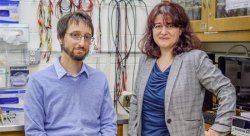Physics Faculty, Members of LIGO Team, Comment on 2017 Nobel Prize in Physics
Professors Rodica Martin and Marc Favata describe impact of ground-breaking work
Posted in: Research, Science and Technology

The Nobel Committee awarded the Nobel Prize in Physics to Rainer Weiss, Barry Barish and Kip Thorne on October 3, 2017. Weiss (MIT) and Thorne (Caltech) are two of the founders of the LIGO project. Barish (Caltech) was the Principal Investigator of LIGO from 1994 to 2005, during the period of its construction and initial operation.
Montclair State University physics faculty members Rodica Martin and Marc Favata are members of The LIGO Scientific Collaboration and have contributed to various aspects of the research that helped prove Einstein’s theories and usher in a new field of gravitational-wave astronomy. Martin helped design and install components of the major upgrade to LIGO that made the first detections possible. Favata works on theoretical modeling of the gravitational-wave signals, as well as educational outreach activities on behalf of the Collaboration.
“LIGO is just starting to crack open a new field of astronomy; so far we’ve observed four black hole collisions – the latest announced just last week,” says Favata. “As the detectors get more sensitive and the network of detectors grows, we’ll learn much more about black holes and other objects that produce gravitational waves. And hopefully there will be big surprises! Barish, Thorne, and Weiss left a scientific legacy to the world, and we’re only just starting to understand its implications.”
Both Favata and Martin agree that this particular trio of scientists have, collectively and individually, motivated a generation of scientists to enter the field – a roster that includes Montclair State University’s faculty and students.
“He made me feel my work was very valuable and this encouraged me to keep going,” said Martin, recalling an early interaction with Rainer Weiss at her first presentation, shortly after joining the LIGO team.
You can read Professor Favata’s thoughts about the science behind LIGO’s discovery of gravitational waves, and the effort that was decades in the making.
